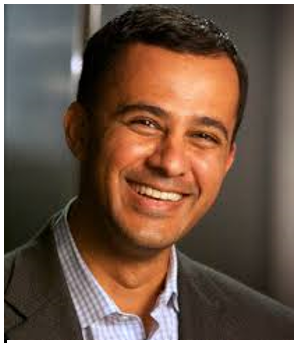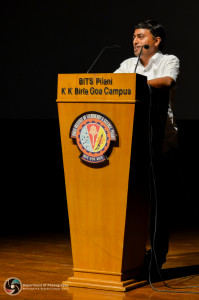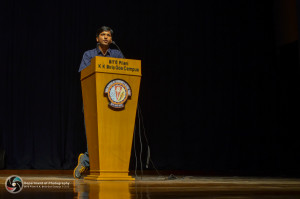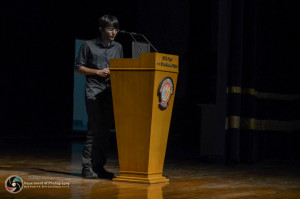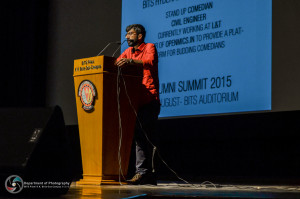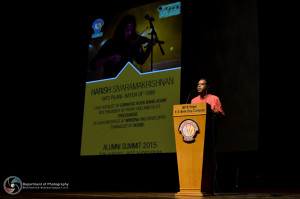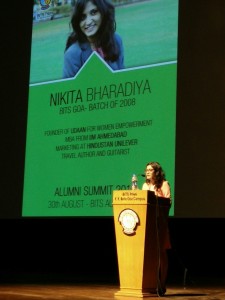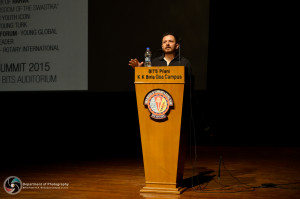Antibiotic resistance is a burning topic today and there is very little awareness in the world about it. Did you know that antibiotics are a finite resource? Did you know that the existing antibiotic drugs are going to stop working for everyone in some years from now? On the occasion of World Antibiotic Awareness Week (November 16 to 22), WHO launched the first global campaign for the better use of antibiotics.
We, at BITSAA, caught up with Dr. Ramanan Laxminarayan, a fellow BITSian from the batch of 1988 who has been one of the forerunners in advocating this cause worldwide: from being a part of the Advisory Committee formed by President Obama to tackle this problem in the USA to being actively involved with the Government of India’s Mission Indradhanush.
Dr. Laxminarayan is currently the director of the Center for Disease Dynamics, Economics & Policy at Washington DC, and is the Vice-President for Research and Policy at the Public Health Foundation of India (PHFI).
After graduating from BITS with an Electronics and Instrumentation degree, he went to pursue a PhD in Economics and a Masters in Public Health.
He is also a senior research scholar and lecturer at Princeton University. He has worked comprehensively with the World Health Organization (WHO), the US National Academies of Science/Institute of Medicine and World Bank on evaluating malaria treatment policy, vaccination strategies, the economic burden of tuberculosis, and control of non-communicable diseases.
———————————————————————————————————————
You have had a very unique career path. You did your Instrumentation at BITS, then you came to the US for your Masters in Public Health with a focus on Epidemiology, and then you went on to do your PhD in Economics. So how did this transition happen?
Right after BITS, I had fallen ill during my Practice School, so I graduated about 6 months after the rest of my class because I had to redo my PS. So, I did two things during that time. I was a PS2 instructor and I was also working on setting up an NGO to clean up the Adayar and Koovam rivers in Chennai, which if you’ve lived in Chennai, you know these aren’t exactly pleasant places to be. I have always had this interest in the environment. That is something I am very passionate about. I actually didn’t go in for a Masters first, I went in for a PhD in Economics, with a focus on Environmental Economics and I went to work with someone very specific at the University of Washington that I read about.
I went to Seattle for this and for my visitation, I decided to work on a topic which was a little unusual which was to think of the effectiveness of antibiotics as a natural resource, much like you’d think of fish or trees. The topic was not yet so much in the news as it is these days. That’s why I went in to do that and it was what I was interested in. I did my PhD on that and along the way to learn the public health aspects, I enrolled in classes on Epidemiology and Biostatistics and so forth and my Masters in Public Health was incidental and not the trajectory I was really on.
More than 10 years after that, I went to work at a Think Tank at Washington DC, called ‘Resources for the future’, which is considered a centre of the mind space for the people working in Environmental Economics at Washington DC. So I joined this organization and I was teaching at Johns Hopkins.
Around 2007, I switched to teaching at Princeton but I kept my job at Resources for the future. However, by that time I was a lot more drawn into public health in a more general sense, like disease control project which is a very central academic exercise in the world of global health. Although I had one leg in the environmental side, even at Princeton my appointment was and is at the Princeton Environmental Institute, I was still drawn into these other directions like working for Public Health.
I’m really not a health economist, I’m really an economist who is interested in the environment. But subsequently I have done a lot more work on just pure health, on things like vaccines and malaria.
In 2011, I had moved to India to set up and work on the Public Health Foundation of India. At the same time, I had set up a Think Tank in DC called Center for Disease Dynamics, Economics & Policy. It was obviously a sort of balancing act between Princeton and these two jobs. There is a consistency in the thread that I’m interested in these ideas but I didn’t really set out to do Epidemiology to begin with.
Is it challenging to do this kind of multi-tasking?
It is and it isn’t! If you’re interested in an idea and you’re interested in following the idea to its multiple conclusions, it’s like one big exclamation. To me it’s just a lot of fun, I’m really lucky to have the freedom to think about whatever I want to think about and I value that above everything else. That’s something that comes from being in academics fundamentally, although I have these other jobs which are administrative and to run organisations. At the core of it, it’s the gift of being in academia. And then you get to learn, I really didn’t go to a lot of classes when I was in BITS, so this is an opportunity for me!
Talking of BITS, what was your BITSian life all about? What would be the one, most prominent memory of your BITSian life?
The answer would need a book. BITS was one, long trip – forming friendships that would last decades, and realizing that much of education is outside the classroom. It is hard to overestimate the impact that that place has had on me in every dimension. That moment I described where Dr Venkateswaran just listens to us for five minutes and then says – go for it – those were moments that were tremendous for confidence building and believe in oneself.
BITS helped me grow in many ways but particularly in being adaptable and resilient. I was secretary of ELAS during my time there and we were constantly creating and making do with less both during the year and during APOGEE and Oasis. That’s a valuable lesson for life.
We started TRACS (Trekking Club) on April 6, 1990 after a trek to Pindari glacier that Sanjay Ramabhadran and I went on. We were totally unprepared, wore tennis shoes and no gloves and somehow made it there and back. When we got back, we went to see the then director Dr. V who immediately asked what we would need and assigned Rs 10,000 to purchase equipment. It was unbelievable! Earlier this year, I took my son on the Pindari trek, 25 years after Sanjay and I went there. It was exciting to do this again. I’ve trekked in many places around the world but Pindari was my first major trek and one of my most memorable.
About antibiotic resistance…We understand the problem in hand: With the abuse of antibiotics, we have unknowingly assisted the proliferation of antibiotic resistant bacteria and now we are struggling to find effective ways to treat bacterial infections. How was this even identified as a global health issue?
The issue has been known since the time of Alexander Fleming, the person who discovered the first antibiotic, penicillin. And in fact, resistance has been with us for a very long time and it isn’t unusual at all. This is a problem that has slowly increased over time to reach the situation it is in now, where half the antibiotics don’t work. So, it is not a surprising problem, it’s just basically natural selection of sensitive bacteria where we are left with only the resistant bacteria.
It’s not rocket science in that way but as a consequence, we are facing a huge public health crisis. In many parts of the world the antibiotics are no longer working and we don’t have a good alternative. So, we either have to start using the antibiotics that we do have, responsibly or we really risk being in a situation where someone with an infectious disease has a higher probability of dying.
So, what’s the economic aspect to this problem?
This is an economic problem because it is a problem of the commons. And by that I mean, if I take medicines for heart disease or arthritis, that doesn’t change the effect of these drugs for you or for anyone else. But that is not true in the case of antibiotics because if I take antibiotics, then since I am selecting for the resistant bacteria and these can get transmitted, it won’t work so well for you or for other people. So in that sense it’s a global common issue where actions of an individual or groups of individuals have consequences for everyone else. It starts looking much more like a problem of climate change than it does like a medical problem.
Doctors in the United States and presumably in India as well, prescribe a lot of antibiotics. Why do they do so? Is it because they are not cognizant of this problem?
Well, there is a reason why they do offer antibiotics, but it is not always backed up with substantial evidence. At the end of the day, when you think of the doctor-patient interaction, it is in the realm of soft side. There is a dynamic there. The doctor wants to satisfy the patient, they don’t want the patient to go to a different doctor. It is not a precise engineering sort of equation where the doctor says, yes you need an antibiotic and writes out one where it’s appropriate or he says, oh you don’t need one and doesn’t write one where it is not appropriate. Because there is that human interaction, there is room for all these other considerations to come into play.
How serious is the problem of anti-biotic resistance in countries around the world and what is each country doing about it?
There is a report that we put out last week for the state of the world’s antibiotics: http://www.cddep.org/publications/state_worlds_antibiotics_2015
The problem is all around the world although of varying magnitudes but it’s certainly all around the world. We worked in many countries. The global antibiotic resistance partnership works in over eight countries: India, Nepal, Vietnam and then Mozambique, South Africa, Kenya, Uganda and Tanzania. So, we do a lot of global work as well.
Let’s take India, for instance. At the government level, are they aware of this problem, and do they know that this will become serious in the times to come?
Very much so! But, you know, all these things always are a question of priorities. And sometimes, the instinct is to go after what is on the front page news rather than to solve a problem that is two or four years away. Even if it is here right now, there is not a public outcry at all. I think India has not done enough on this problem. Extensive coverage by media and cover stories on newspapers are the kind of stuff that are important. Because at the end of the day, it is the civil society and the media that put pressure on the government to act. In the US, there has been a lot of action. Last year, president Obama assigned an executive board on antibiotic resistance. In fact, I was on advisory committee to recommend solutions on how to tackle the problem. Some countries much more action, India, sadly, not so much.
Are people aware of the seriousness of this issue? Do we have data to convince people that this is a serious issue?
I think there is enough data but obviously, you are talking to someone who pays attention to this data, particularly because that is my career. I don’t know of others though. Ask your mother or grandmother, if they realize that this is important. I still find that a lot of people use antibiotics quite unnecessarily and they don’t understand this issue. But this can change. It is similar to, for instance, tobacco usage.
When I visited BITS last year, I found that nobody smoked at Sky! Back then, it was unimaginable. Twenty years ago, when I think practically, everyone would have smoked. So, that’s a significant change in not just the institution rules but also what is considered acceptable in your generation compared to mine. I think it is a change in the mindset of the people. So, I think the current situation, with respect to antibiotic usage, would change and it can change. In fact, we don’t have a choice, it has to change!
How can a common man contribute towards solving this issue, however small the scale may be? What would your advice be for a doctor and a patient?
Doctors don’t have that much of an incentive except they can get information and get aware of the damage they are causing. For individuals, I don’t think people realize that if they take antibiotics unnecessarily, they are ruining the chances of the drug working for others as well. A patient always wants the best medication. And he wants to get cured asap. That’s all he cares about in the spur at the moment. That’s the reason it’s the problem of the commons. The commons problem, by definition, is one where you do not consider the effect of your actions on others and therefore you do it just like pollution or driving a car excessively and so forth.
Isn’t it easier to educate doctors?
That is a great point and that would be the rational thing to do. But, the doctor has other incentives. They don’t know if you might come back. They just want to give you something that gets you out of their office asap. They want to make their money in 2 minutes and that’s the way a lot of doctors think. It takes the doctor to exercise some due diligence and some additional network in order to not write the antibiotic prescription. Unfortunately, they don’t have that incentive.
Are there ways of initiating new incentives to get more people to act, then?
Financial incentives are a way to ensure appropriate use of antibiotics, for instance, change the way doctors get paid. But it isn’t that easy. In China, a lot of hospitals overuse antibiotics because that’s how they make their money. Now, you have to change the way these hospitals get paid, so that they don’t rely on the selling more antibiotics to make money. So, these are the challenges that make this problem multisegmented.
What are the strategies, be it in India by the PHFI or in the US by the CDDP, which are being implemented now to try to solve the issue?
There have been different sorts of approaches. Back in 2002, we had the same issue with anti-malarial drugs as well, so, this is very topical. Yesterday, the Nobel Prize in Medicine was given to Youyou Tu and she was part of a team that was credited with the discovery of artemisinin, which is now the front line drug for malaria. Back in 2001, there was a serious concern that because this drug was being used by itself as a monotherapy, that resistance would arise. A group of us had put together a report which was led by a Nobel laureate, Kenneth Arrow, one of the most prominent economists alive today or probably even alive at any time. We had a report which basically called for a global financing mechanism that would make these antimalarial, the quality ones that were in combinations and less likely to be resistant, cheaper. So what that means is that if you make the combinations cheaper, then no one will use the type that will cause resistance. But because this was a global commons issue, this couldn’t be paid at the country level so that it could be paid at the global level.
And subsequently, we did manage to establish something called the affordable medicines facility for malaria. It was close to a half a billion dollar facility that would allow us to subsidize quality antimalarials at a very high level. So, that is an example of the kind of thing we have done at the global level. At country levels, the solutions are actually not that difficult. The first is to improve public health.
In India, there is now a big program called Mission Indradhanush which is a part of my immunization work. We can get vaccines out so that children are less likely to need antibiotics. Second is, of course, water sanitation which is slowly improving. Third area is the hospital infection control. A lot of hospitals overuse antibiotics because they have no incentive to reduce the quantity of infections. This is a major focus in India because no one is really aware of the fact that there is high likeliness to get infected when you go to the hospital for some other condition, say for example, you go for a hip replacement and you could get a hospital acquired infection.
So, the pathways to solving the problem are quite clear but gathering the tools to implement them is the real challenge.
Essentially, the common theme underlying the three approaches you spoke about, to solve the issue of antibiotic resistance, is prevention of infections. If this can’t be achieved, is there a way to make a superior antibiotic to outplay the resistant bacterial strains? And if we can, will it go through the same cycle of becoming ineffective since the bacteria will evolve to become resistant to them at some point? Are we getting into a vicious cycle then?
That’s exactly right. We can’t outplay the bacteria at this scale because they will always come up with solutions faster than we can come up with a new drug. So, our solution so far has been to stay one step ahead, by coming up with a new antibiotic. But that is a very expensive way of staying ahead. Instead, what we should do now is to slow down this race between us and the bacteria by reducing selection pressure. So, there are two things. One is to reduce the need for antibiotics, that’s what you just mentioned.
Lots of antibiotics get seriously overused because people buy antibiotics over the counter, they self medicate, doctors prescribe them unnecessarily. In the US, about half of the antibiotic usage is considered unnecessary and I speculate the proportion in India might be even higher. Also, antibiotics are used in animals for making them fatter, faster and so forth. At some point, we really have to make a tradeoff.
If you truly want antibiotics to save a dying child’s life, then you can’t use it for all the other things that it is being used for. It’s amazing the wide range of things that antibiotics are used for, like aquaculture, for shrimp farming and anything that requires the bacteria to stay at a distance. You really can’t have it all. Once the environment is made up of resistant bacteria, you can’t turn the clock back.
That is precisely my next question. Is this change even reversible now? Are we going to be able to combat these bugs once let’s say they are all going to be antibiotic resistant and we are going to go back to using them appropriately?
That’s a good point. It actually turns out that the answer is a little more complicated. In a general sense, the resistant genes, the genes that are selecting for resistance are out there in the environment. You can think of it like this: all the information is out there, it’s a big library and any bacteria can check out the book and figure out how to be resistant and then learn that process. So, they have the common knowledge. However, if we use lesser antibiotics, then there is less chance where the bacteria are actually using that information. A slightly scientific explanation is that there is a process called fitness cost of resistance.
If you are a bacteria and you are maintaining the knowledge of how to be resistant, you are doing something else less effective than likely, which could be reproduction or the thickness of your cell wall or something along those lines. So, there is a cost of resistance and therefore not all bacteria are always up to date on the knowledge of how to be resistant. You can be sure, however, that when you use antibiotics, they will quickly learn. If we start reducing the use of antibiotics, it is very likely that that resistance will go down. It will take time but it has been shown to happen in many instances.
Would monitoring pharmacies help collect better, more realistic data on the overuse of antibiotics? That way, we will have authentic information to act upon.
Well, you think that pharmacies can be monitored? What they do is against the law. The law says that you need a prescription. I can guarantee you that if you walk across to any pharmacy and ask for an antibiotic, they’ll give it to you. They’ll give the most powerful antibiotic that they can sell to you. So, here in India, we don’t have a regulatory system that is able to enforce a rule that has been in existence for a very very long time. These are not new regulations.
There did exist a pre-antibiotic era where people managed to fight bacterial infections and hence survive. Is there a possibility for our immune system co-evolve to combat the antibiotic resistant bacterial strains?
I don’t know if our immune system will help us, but certainly the burden of infectious diseases is much lower now, compared to before. For that reason, antibiotic resistance may not be that big of a problem now, as it would have been before. For instance, vaccines and better sanitation were not common then. On the flip side, a lot of things we do now require the use of antibiotics, like surgeries and transplants, that were not so prevalent before. It is virtually impossible to cut open someone’s body without using antibiotics. So, here, we will need more antibiotics than the past.
How about allocating funding for research groups that work on finding solutions for the issue of antibiotic resistance? Has this money allocation increased in the recent times, since the advent of this issue? Seems like a prudent way of spending money to prevent the problem.
Sadly this has not happened except in a few exceptions. India has almost no additional resources to offer. Many high-income countries have chosen to spend their money on subsidizing industry research on specific antibiotics. More money is needed for research on how to reduce the likelihood of resistance and how to make better use of existing antibiotics including behavioral research to help reduce unnecessary use of antibiotics.
Recently, we saw that Youyou Tu, the Nobel Prize winner for finding a novel cure for malaria, found the cure in natural herbs. So, do you think that we should complement allopathic medicine with other systems of medicine, such as ayurveda, thereby reducing our dependency on antibiotics? Should India and the world then revamp their medical courses and include all relevant systems of medical treatment in their curriculum?
This is not straightforward. Artemisinin, the drug that Youyou Tu and colleagues isolated was found from sweet wormwood. Simply drinking wormwood tea would not have helped most malaria patients. So isolating the active ingredient was critical. Searching traditional products for such active ingredients would be a productive activity. I’m not sure every allopathic doctor can become expert in non-allopathic modalities any more than an ayurvedic doctor can learn western surgical procedures through a few courses.
———————————————————————————————————————
We hope you enjoyed this interview with Dr. Laxminarayan. Let us all be aware of this global threat called antibiotic resistance, swear to be more prudent and cautious with the use of antibiotics and spread the awareness around, like the World Health Organization (WHO) wants us to! (http://www.who.int/mediacentre/events/2015/world-antibiotic-awareness-week/event/en/)
To learn more about Dr. Laxminarayan’s research and his initiatives to address antibiotic resistance, below are a few weblinks to his talks and interviews:
http://www.ted.com/talks/ramanan_laxminarayan_the_coming_crisis_in_antibiotics
http://www.npr.org/2015/07/17/421490567/how-did-a-medical-miracle-turn-into-a-global-threat
http://www.huffingtonpost.in/open-magazine/how-india-became-the-anti_b_8440100.html

